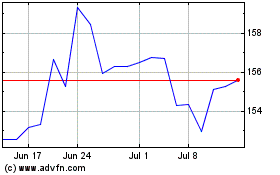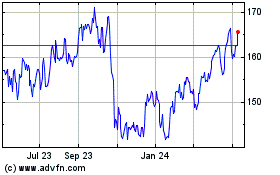Notice of Exempt Solicitation. Definitive Material. (px14a6g)
April 16 2015 - 2:49PM
Edgar (US Regulatory)
NAME OF REGISTRANT: Chevron Corporation
NAME OF PERSON RELYING ON EXEMPTION: Green Century Capital Management
ADDRESS OF PERSON RELYING ON EXEMPTION: 114 State Street, Suite 200, Boston, MA 02109
Written materials are submitted pursuant to Rule 14a-6(g)(1) promulgated under the Securities Exchange Act of 1934. Submission is not required of this filer under the terms of the Rule, but is made voluntarily in the interest of public disclosure and consideration of these important issues.
Proposal No. 6 on Chevron Corporation’s 2015 Proxy Statement:
Argument in Favor
Resolved: The shareholders request that the Board of Directors adopt a policy to refrain from using corporate funds to influence any political election.
Supporting Statement: “Using corporate funds to influence any political election” for purposes of this proposal, includes any direct or indirect contribution using corporate funds that is intended to influence the outcome of an election or referendum. This also includes expenditures for electioneering communications on printed, internet or broadcast communications, which are reasonably susceptible to interpretation as in support or opposition of a specific candidate. The policy should include measures to prevent trade associations or non-profit corporations from channeling our company’s contributions or membership dues to influence the outcome of any election or referendum.
As corporate spending to influence election outcomes has increased over the past few years, shareholders have become concerned about the potential risk to shareholder value by this use of company funds. Given the risks to reputation and brand, and the low accountability and transparency measures Chevron has in place to govern this use of company funds, we believe that Chevron Corporation (Chevron) can best minimize this threat to long-term shareholder value by establishing a policy to refrain from using corporate funds to influence any election outcome.
This is not a solicitation of authority to vote your proxy. Please DO NOT send us your proxy card; Green Century Capital Management is not able to vote your proxies, nor does this communication contemplate such an event. Green Century Capital Management urges shareholders to vote for Item number 6 following the instruction provided on the management’s proxy mailing.
Rationale For a “Yes” Vote
|
|
|
1.
|
Increased corporate spending in campaign elections is deeply unpopular across political lines, and consequently exposes companies to business and reputational risks. By eliminating such spending to influence election outcomes, Chevron can reduce risk and protect long-term shareholder value.
|
|
|
2.
|
Chevron spends considerable sums to influence election outcomes, and has weak accountability and transparency measures in place to oversee this use of company funds and its risks to the company.
|
|
|
3.
|
A growing number of companies are determining that it is in their best interest to refrain from political spending to influence election outcomes.
|
|
|
4.
|
The proposal would not curtail Chevron’s ability to communicate views to policymakers (e.g., lobbying of legislators, which is not addressed in this proposal).
|
In the proponents’ view, a comprehensive implementation of a refrain on political spending from the corporate treasury would ultimately prohibit: (1) direct contributions to candidates and parties at the state level (such gifts at the federal level are already disallowed under federal law), and (2) indirect contributions from treasury funds, by which we mean those made to third-party recipients (such as trade associations, 527s and 501(c)(4)s) for the purpose of political spending).
1. Increased corporate spending in campaign elections is deeply unpopular across political lines, and consequently exposes companies to business and reputational risks. By eliminating such spending to influence election outcomes, companies can reduce risk and protect long-term shareholder value.
|
Experts have estimated that $3.7 billion was spent in the 2014 electoral cycle,1 largely enabled by the Supreme Court’s 2010 Citizens United v. FEC decision, which allowed unions and corporations to contribute unlimited amounts to “independent” spending organizations.2
These developments are deeply unpopular among the U.S. public across political lines:
|
|
·
|
More than 8 in 10 Americans support limits on the amount of money given to groups trying to influence U.S. elections, with 85% support among Democrats, 81% among Republicans, and 78% among independents, according to a 2012 poll by the Associated Press and the National Constitution Center.3
|
|
|
·
|
79% of respondents to a 2012 Bannon Communications poll said they would boycott a company to protest its political spending, 65% would sell stock in the company, and over half would ask their employer to remove it from their retirement account.4
|
|
|
·
|
A recent study by Global Strategy Group concluded that corporations have more to lose than gain in terms of their public image through their involvement in politics. The study found that “on average…a company’s favorable rating dropped by a whopping 42 points among people that disagreed with its stance. Among people that agreed with the position, there was no statistically significant change in a company’s favorable rating.”5
|
During a time when public support for high spending levels in elections is low, investors are concerned about the reputational risks that Chevron is exposed to by positioning itself as one of the largest contributors in election campaigns. Companies in highly regulated industries are often perceived as attempting to buy the influence of elected officials and other public policymakers because their regulatory environment is challenging. As such, investors need to be sensitive to the risks that these types of companies may face.
1 Cillizza, Chris. (11/6/2014) “The 2014 election cost $3.7 billion. We spend twice that much on Halloween.” The Washington Post. http://www.washingtonpost.com/blogs/the-fix/wp/2014/11/06/the-2014-election-cost-3-7-billion-we-spend-twice-that-much-on-halloween/
2 Center for Responsive Politics, March 13, 2013 (http://www.opensecrets.org/news/2013/03/the-2012-election-our-price-tag-fin.html).
3 http://blogs.wsj.com/law/2012/09/17/poll-most-american-support-limits-on-political-spending
4 http://www.citizen.org/documents/bannon-communications-research-executive-summary.pdf
5http://images.politico.com/global/2013/03/27/gsg_study_white_paper_business_and_politics_do_they_mix.html
2. Chevron spends considerable sums to influence election outcomes, and has weak accountability and transparency measures in place to oversee this use of company funds and its risks to the company.
|
As investors, we seek to understand and minimize business risk with regards to the company’s role in the public policy arena. We do so by encouraging transparency and accountability in the use of staff time and corporate funds to influence legislation and regulation both directly and indirectly. Chevron received a low transparency and accountability rating of 41 out of 70 possible points (58.6%) in the CPA-Zicklin index, which ranks companies within the S&P 100 on 25 indicators related to political spending disclosure, policies, governance, and oversight.6 This score puts Chevron in the bottom third tier (four tiers total) of companies ranked. Several academic studies suggest that large corporate donations may be linked to poor corporate governance and low shareholder power, making it difficult for shareholders to determine and monitor whether this use of company funds is in the long-term interest of the company.7
Chevron’s political contributions have attracted significant negative media attention and public backlash, damaging the company’s goodwill in the communities where it operates and threatening its social license to operate. For example, Chevron damaged already strained community relations in Richmond, California-- where the company operates a refinery that exploded two years ago and has faced ongoing pollution concerns-- by spending excessive sums in a failed attempt to influence local elections. Despite outspending the opposition 20:1 in its $3 million campaign to influence local elections in Richmond, Chevron failed to secure sufficient support to get a single candidate it backed into office, and instead attracted significant public backlash and negative media coverage for what local media characterized as ‘excessive’ and ‘obscene’ spending.8 This is part of a larger trend of negative publicity surrounding Chevron’s outsized spending levels intended to influence elections. In 2012, the company made the largest single corporate donation in history at that time, with its $2.5 million contribution to a GOP SuperPAC, helping to make the 2012 elections the most expensive in history. These controversies illustrate the risks to the company’s goodwill, social license to operate, and long-term shareholder value associated with Chevron’s political contributions. Given the company’s low accountability and high spending levels, shareholders are concerned that the risk posed to shareholder value by this use of this company funds is increasing and unchecked.
3. There are a growing number of companies that are determining that it is in their best interest to refrain from political spending.
|
A growing number of high-profile companies including Goldman Sachs, IBM Corp. and Accenture do not spend corporate treasuries to influence elections, and also do not permit their trade associations to use their membership dues to advance political agendas.
4. The proposals would not curtail the company’s ability to engage in the political process because other avenues are available to communicate its views to policymakers.
|
While Chevron argues in its opposition statement that implementing this policy would bar the company from participating in the political process, our proposal is focused only on contributions to influence election outcomes and does not affect the company's ability to lobby government officials on specific issues relevant to the company. Rather, this proposal specifically seeks to address the use of corporate treasury funds to support the election of political candidates.
6 http://www.politicalaccountability.net/?ht=a/GetDocumentAction/i/8642
7 Rajesh Aggarwal, Felix Meschke, and Tracy Yue Wang, “Corporate Political Donations: Investment or Agency?” April 5, 2012 (http://papers.ssrn.com/sol3/papers.cfm?abstract_id=972670). ; John Coates, Harvard Law School, “Corporate Politics, Governance, and Value Before and After Citizens United,” July 6, 2012 (http://papers.ssrn.com/sol3/papers.cfm?abstract_id=2128608).
8 http://www.sfgate.com/bayarea/article/Chevron-s-3-million-backfires-in-Richmond-5873779.php
Chevron is spending increasing sums to influence election outcomes, with weak accountability and transparency measures in place, and unclear returns to shareholders. Proponents are concerned that this use of company funds exposes Chevron to business and reputational risks, including damage to its social license to operate in the communities where it is located. While Chevron argues that implementing this proposal would disadvantage the company relative to those expressing contrary views, spending in an attempt to influence election outcomes is a highly controversial and a risky practice. Consequently, companies that voluntarily refrain from gambling in political elections may reduce key risks and enjoy advantages relative to those engaging in this practice. A self-imposed ban on this use of company funds would reduce the potential risk to shareholder value while still allowing the company to have a stake in the political process via its lobbying activities.
Consequently, shareholders believe that Chevron should refrain entirely from using company funds to influence election outcomes and we urge you to vote in favor of this resolution.
Written materials are submitted pursuant to Rule 14a-6(g)(1) promulgated under the Securities Exchange Act of 1934. Submission is not required of this filer under the terms of the Rule, but is made voluntarily in the interest of public disclosure and consideration of these important issues.
This is not a solicitation of authority to vote your proxy. Please DO NOT send us your proxy card; Green Century Capital Management is not able to vote your proxies, nor does this communication contemplate such an event. Green Century Capital Management urges shareholders to vote for Item number 6 following the instruction provided on the management’s proxy mailing.
Chevron (NYSE:CVX)
Historical Stock Chart
From Mar 2024 to Apr 2024

Chevron (NYSE:CVX)
Historical Stock Chart
From Apr 2023 to Apr 2024
